|
|
|
Sort Order |
|
|
|
Items / Page
|
|
|
|
|
|
|
| Srl | Item |
| 1 |
ID:
186808
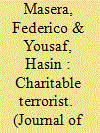

|
|
|
|
|
| Summary/Abstract |
Violent organizations are often providers of many social services in competition with the state. We provide evidence that these organizations use the provision of social services to gain support. This strategy is only effective when it fills the void left by a weak state. We show this by studying the provision of natural disaster relief by the Pakistani state and the Taliban. We first analyze the floods of 2010 that received an inadequate response from the government and show that support for the Taliban increased in the areas affected by the flood. These effects were concentrated in places where the Taliban likely provided help and where the state under-delivered. We then study the 2005 earthquake that instead received a swift government response and show that the Taliban lost support in the affected areas. Results cannot be explained by alternate mechanisms as anger against incumbents, political competition, electoral participation, and religiosity.
|
|
|
|
|
|
|
|
|
|
|
|
|
|
|
|
| 2 |
ID:
186810
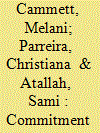

|
|
|
|
|
| Summary/Abstract |
A core function of contemporary states is to ensure the security of their citizens. Yet in many post-conflict settings, non-state actors provide security alongside the state, typically prioritizing their own ascriptive groups and potentially undercutting a sense of national political community. When do citizens prefer group-specific versus national security? While most studies focus on individual psychological factors, we argue that group-level characteristics also shape political preferences. Based on a conjoint experiment in Lebanon, we explore the relative appeal of group-specific versus national pledges to assure protection. We find that respondents view national security provision quite positively, while members of communities with stronger group-specific security simultaneously favor private provision. Individuals with closer ties to credible group security providers are also more likely to prefer those services. Citizens therefore do not see a clear trade-off between private and public protection, while group-specific legacies mediate heterogeneity in support for pluralist security provision.
|
|
|
|
|
|
|
|
|
|
|
|
|
|
|
|
| 3 |
ID:
186811
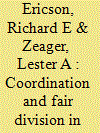

|
|
|
|
|
| Summary/Abstract |
We analyze the problem of international responsibility sharing for a refugee group seeking protection from the dangers of mass violence arising from inter-state conflict or the collapse of a fragile state. After reviewing several proposed solutions, we characterize responsibility sharing as a coordination problem in a simple sequential “moves” game between two potential host countries. We demonstrate that, ultimately, the country that makes the first move to receive refugees bears a disproportionate responsibility. We then draw on two historical case studies that illustrate the difficulties of coordinating a fair division of refugee responsibilities. To solve the coordination problem, we adapt a fair division procedure by inverting one first presented by Hugo Steinhaus for dividing “goods.” We demonstrate that the procedure is applicable to costly “obligations” under different scenarios and is manipulation proof, as each participating country has an obviously dominant strategy.
|
|
|
|
|
|
|
|
|
|
|
|
|
|
|
|
| 4 |
ID:
186812
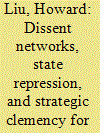

|
|
|
|
|
| Summary/Abstract |
Why do governments severely punish some dissidents while showing mercy to others? This study argues that when constrained by limited information on dissent, states have incentives to cast the net of repression wider by executing not just key dissent actors but also members closely connected to them to ensure demobilization. States also crave information, and granting clemency to defectors who bring in information improves state intelligence. Given that tips have different values, regimes will grant clemency to defectors who are closely connected to key dissent actors and possess high-value tips, allowing the state to pursue top fugitives and dissolve resistance more efficiently. Using newly declassified data on political victims during Taiwan’s White Terror authoritarian period, I find that the regime tends to execute both key actors (i.e., leaders and recruiters) and their closely connected members. Defectors who share information tend to receive mercy, but defectors closely connected to key actors are much less likely to face execution than less connected defectors. These findings shed new insight into the toolkit dictators use to gather intelligence on dissent and how strategic clemency induces defection and betrayal among dissidents, helping destroy dissent networks from within.
|
|
|
|
|
|
|
|
|
|
|
|
|
|
|
|
| 5 |
ID:
186813


|
|
|
|
|
| Summary/Abstract |
Do more protesters on the streets make governments likely to grant their demands? Several studies link protest size and government concessions. Yet existing research has limitations: many studies suffer from potential endogeneity due to potential protesters joining protests when they anticipate that concessions are likely, causal mechanisms are often unclear, and many of the most rigorous event-level studies are limited to Western democracies. We reexamine this relationship in a non-Western sample using a novel instrumental variable approach, using Fridays as an instrument for exogenous variation in protest size in predominately Muslim countries. We perform two analyses: one using the NAVCO 3.0 dataset, and the second using the Mass Mobilization in Autocracies Dataset (MMAD). In both analyses exogenous variation in protest size negatively affects the likelihood of concessions. Larger protests are less likely to receive government concessions. We suggest these surprising results point to the importance of unanticipated protests that produce new information about regime stability to motivate government concessions.
|
|
|
|
|
|
|
|
|
|
|
|
|
|
|
|
| 6 |
ID:
186819


|
|
|
|
|
| Summary/Abstract |
Because existing issue classification schemes omit prominent issues (e.g., domestic armed conflict) or contain significant within-category heterogeneity, theorizing about the role of issues in international conflict processes has stagnated. Our project jump-starts it again, by independently—and systematically—reconceptualizing and gathering data on five issues connected to dyadic militarized interstate disputes (MIDs) during the period 1900–2010: land (borders), maritime (borders), islands, civil conflict, and coups. After conceptually introducing these issues and embedding them within a larger framework, we describe and apply our MID-Issue data. These efforts show that (i) the MID dataset’s issue classification scheme does not systematically capture our issues, (ii) events in 37.58% of dyadic MIDs connect to domestic armed conflict—a prevalence not on the field’s radar, (iii) some factors promote issue-based international conflict, but only via indirect channels, and (iv) significant value even derives from a further conceptualization of “territorial issues” (broadly defined).
|
|
|
|
|
|
|
|
|
|
|
|
|
|
|
|
| 7 |
ID:
186817
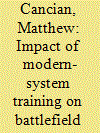

|
|
|
|
|
| Summary/Abstract |
What drives soldiers to risk death on the battlefield? Scholars have suggested that battlefield participation is driven by ideology, coercion, and cohesion while overlooking the importance of confidence in tactical success. On contemporary battlefields, training in effective, modern-system tactics will increase initial confidence and create a positive feedback loop of battlefield participation and combat effectiveness. I test this theory through the as-if random assignment of Peshmerga (Kurdish soldiers) to modern-system training by Western countries. One third of the Peshmerga had no formal training, one third had non–modern-system training from other Peshmerga, and one third had been trained in the modern-system. While non–modern-system training slightly increased unit confidence, it did not impact battlefield participation; coalition training in modern-system tactics dramatically increased confidence and, more importantly, led to higher levels of self-reported battlefield participation
|
|
|
|
|
|
|
|
|
|
|
|
|
|
|
|
| 8 |
ID:
186807


|
|
|
|
|
| Summary/Abstract |
Although only 23 people on average have been killed per year by terrorist attacks in the United States since 2001, American citizens and politicians consistently rank terrorism as a top security threat, leading to costly wars abroad and the repression of civil liberties at home. To what extent can education about terrorism alter perceptions of the threat? Much existing scholarship—and consistent polling over the past two decades—suggests that it cannot, but we disagree. Evidence gathered from an extensive series of experimental and observational surveys involving students in 31 terrorism and non-terrorism related courses at 12 universities—including massive open online courses (MOOC) and online surveys—reveals that the more individuals learn about terrorism, the smaller they perceive the threat to be to themselves and to the U.S. In the fight against terrorism and the fear it inspires, knowing really is half the battle.
|
|
|
|
|
|
|
|
|
|
|
|
|
|
|
|
| 9 |
ID:
186816
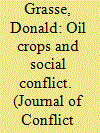

|
|
|
|
|
| Summary/Abstract |
When do agricultural transformations impact social stability? Cash crops are typically associated with economic prosperity and social peace. I argue agricultural booms may spur violent conflict over resource allocation by pitting would-be producers against incumbent landowners when the gains from production are concentrated and the negative externalities are diffuse. I study the rapid expansion of oil palm in Indonesia, a growingly important crop in the global economy. I find when oil palm grows more valuable and expands within producing districts, violent resource conflicts increase. The positive relationship does not exist for other cash crops, nor other types of conflict, and is moderated by the presence of sustainability certified processing mills. The results connect commodity shocks to non-state violence over resources, and suggest land use change is an important mechanism connecting agricultural booms to social conflict.
|
|
|
|
|
|
|
|
|
|
|
|
|
|
|
|
| 10 |
ID:
186815


|
|
|
|
|
| Summary/Abstract |
Despite extensive scholarly interest in the association between economic inequality and political violence, the micro-level mechanisms through which the former influences the latter are not well understood. Drawing on pioneering theories of political violence, social psychological research on relative deprivation, and prospect theory from behavioral economics, we examine individual-level processes that underpin the relationship between inequality and political violence. We present two arguments: despite being a key explanatory variable in existing research, perceived lower economic status vis-à-vis other individuals (an indicator of relative deprivation) is unlikely to motivate people to participate in violence; by contrast, although virtually unexplored, a projected decrease in one’s own economic status (prospective decremental deprivation) is likely to motivate violence. Multilevel analyses of probability samples from many African countries provide evidence to support these claims. Based on this, we posit that focusing on changes in living conditions, rather than the status quo, is key for understanding political violence.
|
|
|
|
|
|
|
|
|
|
|
|
|
|
|
|
| 11 |
ID:
186814
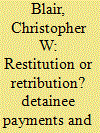

|
|
|
|
|
| Summary/Abstract |
Counterinsurgents frequently rely on mass arrests to impede rebel operations, but in so doing, risk detaining innocent civilians. Wrongful detention can backfire, fueling insurgent violence by alienating detainees and their kin. Can counterinsurgents mitigate wrongful detention through targeted compensation? I study this question using project-level data on US payments to individuals deemed innocent and released from Coalition custody in Iraq between 2004 and 2008. Leveraging plausibly exogenous variation in the allocation of detainee release payments, I document a robust, negative association between counterinsurgent compensation for wrongful detention and insurgent violence. The violence-reducing effects of detainee release payments were greatest in Sunni and mixed sectarian areas; for the types of insurgent attacks, most prone to civilian informing; and when detainee release was complemented by other population-centric reforms. These results suggest that post-harm mitigation helps shift civilian perceptions, inducing civilians to share more information with counterinsurgent forces.
|
|
|
|
|
|
|
|
|
|
|
|
|
|
|
|
| 12 |
ID:
186818
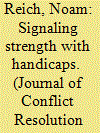

|
|
|
|
|
| Summary/Abstract |
In the presence of incomplete information, strong states have an incentive to invest in costly signals that can differentiate them from weaker states. I argue that states can signal strength by handicapping themselves, deliberately reducing their combat effectiveness. In an ultimatum crisis bargaining model, I show that strong states can reduce the risk of war by making themselves weaker without reducing their demands. The key to this result is a comparative advantage that allows stronger types to fight more effectively with handicaps. This allows for an equilibrium where (1) stronger states adopt larger handicaps, thereby revealing their strength to the receiver, (2) larger handicaps are more likely to deter the receiver, and, (3) the positive risk of war precludes weaker types from imitating handicap signals. The ability to reveal strength peacefully has important ramifications for theories of mutual optimism, war termination, and the relationship between parity and war incidence.
|
|
|
|
|
|
|
|
|
|
|
|
|
|
|
|
| 13 |
ID:
186809
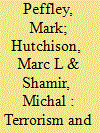

|
|
|
|
|
| Summary/Abstract |
How does terrorism influence citizens’ willingness to deny basic liberties to domestic groups alleged to be “fellow travelers” of the perpetrators of terrorism? Based on intergroup threat theory and social identity theory, we hypothesize that political intolerance toward fellow traveler groups is determined by three factors: (1) the level of terrorism, (2) the degree to which domestic outgroups are alleged to be demographically or politically associated with terrorist groups, and (3) whether individuals identify strongly with the political Right. Consistent with our hypotheses, we find that higher levels of terrorism in Israel over a thirty-year period produce a “diffusion of political intolerance” among Israeli Jews on the Right that extends to domestic groups distant from the perpetrators of terrorism. Our findings have important implications for the study of terrorism, democracy, and political tolerance.
|
|
|
|
|
|
|
|
|
|
|
|
|
|
|
|
|
|
|
|
|